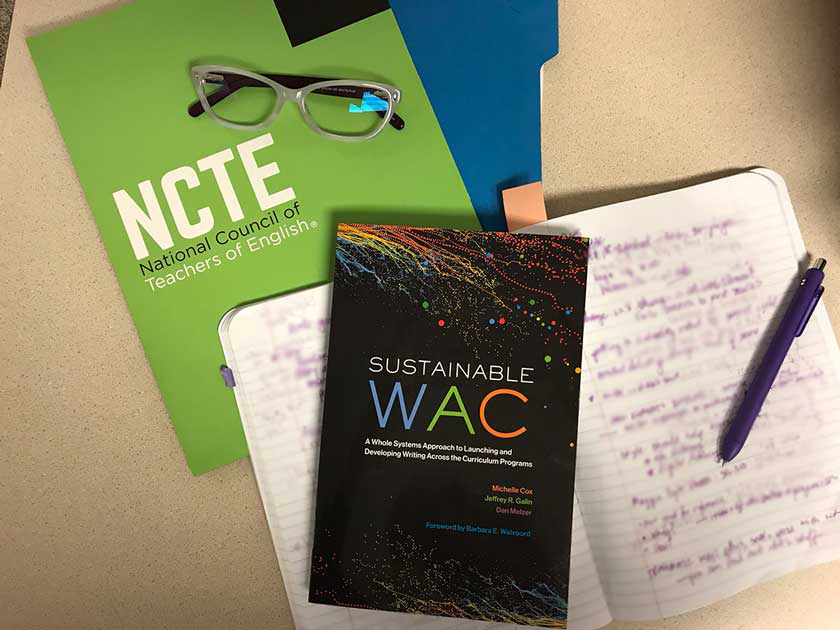This post was written by NCTE members Michelle Cox, Jeffrey R. Galin, and Dan Melzer.
Anyone who has worked on launching, developing, or revitalizing a Writing Across the Curriculum/Writing in the Disciplines (WAC/WID) program knows how much labor is involved.
There is the work of convincing administrators to dedicate resources, persuading faculty to make changes to pedagogy, collaborating with other faculty development initiatives, partnering with other campus writing programs and curricular initiatives, keeping up with the many meetings and administrative tasks involved, and balancing administrative responsibilities with teaching and research to avoid burnout.
This is often a labor of love. And there’s a lot to love about WAC: the joy of creating a community of faculty from across campus, the satisfaction of knowing that your work is creating better teaching and learning conditions across the university, the nurturing of a writing culture on campus.
But what if the WAC program isn’t sustainable? Wouldn’t you want to know that the results of your labor of love will last?

WAC is the longest-standing curricular reform movement in the history of higher education in the United States (Russell, 2002), yet WAC programs fail to survive at an alarming rate of more than 50 percent (Thaiss & Porter, 2010, p. 558). The fact that the statistical survival of WAC programs is less than chance suggests that we have not been paying enough attention to WAC program sustainability. We decided to tackle this problem in Sustainable WAC: A Whole Systems Approach to Launching and Developing Writing Across the Curriculum Programs (NCTE, 2018).
When the three of us first started talking about this project, we were imagining a practical guide for WAC directors. All three of us helped to write the “WAC Statement of Principle and Practices” (2014), on which Michelle had taken the lead, and we were imagining this book as an elaboration or extension of that project.
As founders and directors of WAC programs ourselves, we were well aware that the field of WAC has a rich history of lore, which has been important for passing on knowledge based in the wisdom of experience.
We soon realized, however, that a practical guide was not really going to provide an answer to the vexing question of sustainability. We also realized that while a how-to book would give short-term solutions to immediate problems, it wouldn’t lead to the kinds of transformational changes to curriculum and campus culture that WAC seeks. Our project turned into a much bigger undertaking.
We realized that we needed to turn to theories outside of writing studies to better understand the unique contexts in which WAC programs develop.
Some theories that we found helpful for seeing the university as an adaptive complex system are those that illustrate the dynamics of ecological systems, social networks, resilience and balance, and sustainable development. From this set of related theories, we developed the “whole systems approach.”
Our book is organized around a set of principles, methodology, strategies, and tactics that, when used together, would introduce transformational change to campus cultures of writing and lead to programs that are integrated, highly visible, and sustainable.
In the first three chapters of our book, we describe the whole systems approach, exploring the theories on which it is based, laying out a recursive methodology for program development, and inferring principles and strategies.
The next four chapters each focus on a stage of the whole systems methodology: understanding, planning, developing, and leading. They each start with vignettes from WAC directors and then explore the strategies and tactics that embody the whole systems approach, sometimes drawing on the vignettes as inspiration and other times analyzing the vignettes to see how the whole systems approach might have led to a more sustainable program.
In the final chapter, we bring the whole systems approach to bear on the field of WAC, using the theoretical framework to analyze the current structure of the field, raise questions about the field’s longevity, and suggest ways the field might become more sustainable.
Our goal in writing this book is to honor the labors of love that go into WAC program development and, in fact, any initiative that seeks to transform the curricular ecology of an institution.
In our own institutions, we have been drawing on the whole-systems approach to revitalize an existing WAC program and writing center, develop new projects for a first-year writing program, grow a new community writing nonprofit organization, and build a new graduate communication support program.
We are eager to hear from readers who try to use our approach in their own programs and will value your feedback.

Michelle Cox is the inaugural director of the English Language Support Office in the Knight Institute for Writing in the Disciplines at Cornell University. Her scholarship focuses on WAC program administration, second language writing pedagogy, and graduate communication support. email: michelle.cox@cornell.edu
 Jeffrey R. Galin is an associate professor of English at Florida Atlantic University and director of the University Center for Excellence in Writing, WAC, and Community Center for Excellence in Writing. His research interests are in writing program administration, intellectual property, literacy studies, and multimodal teaching.
Jeffrey R. Galin is an associate professor of English at Florida Atlantic University and director of the University Center for Excellence in Writing, WAC, and Community Center for Excellence in Writing. His research interests are in writing program administration, intellectual property, literacy studies, and multimodal teaching.
 Dan Melzer is an associate professor and director of the first-year composition program at the University of California, Davis. His scholarship focuses on WAC, writing program administration, and multiple literacies.
Dan Melzer is an associate professor and director of the first-year composition program at the University of California, Davis. His scholarship focuses on WAC, writing program administration, and multiple literacies.

